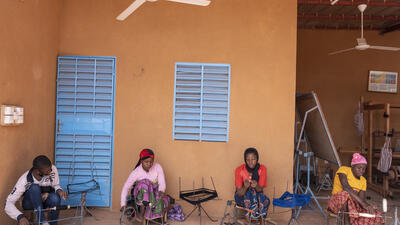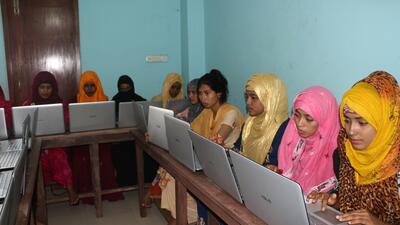Aid for Trade and the private sector: A partnership that works
The private sector is a key partner in fostering economic development through investments in new businesses, creating jobs and providing an innovative range of goods and services. All these activities have potential benefits for the least developed and developing economies.
The 2011 joint Organisation for Economic Co-operation and Development (OECD)/World Trade Organization (WTO) Aid for Trade at a Glance report highlights the significant impact Aid for Trade programmes have had on the private sector. Since the launch of the initiative in 2006, US$ 137 billion has been committed, of which 44% has been devoted to building productive capacity and 53% to economic infrastructure, both of which are critically important to the private sector.
The report also shows how Aid for Trade has become a priority for an increasing number of developing countries and donors, and how it is being connected to the broader development agenda, with strategies and priorities increasingly focused on competitiveness and trade-led economic growth.
Five years into the initiative, donors’ commitment to Aid for Trade remains as solid as ever; financial commitments and disbursements have been growing at an average annual real rate of 15% and 12%, respectively, for each year since 2006, reaching US$ 29 billion in 2009. The share going to low-income countries and consequently to the sub-Saharan African region has been steadily rising. While G20 leaders are committed to maintaining, at least, the levels reached during the 2006–2008 period, some debt-laden Development Assistance Committee (DAC) donor countries may find it difficult to raise their financial commitments in response to the higher demand for Aid for Trade. However, the continued growth of South-South cooperation can become an important complement to the support provided by DAC donors.
Case stories submitted for the report demonstrate how Aid for Trade can support government efforts to build the human, institutional and infrastructure capacity required to integrate into regional and global markets and benefit from trade opportunities. Several industry-specific programmes have been introduced to help the private sector better access foreign markets and integrate into regional and global value chains.
For instance, efforts to provide trade finance were critical in the wake of the 2008 global slowdown. Access to credit is crucial for the private sector, and OECD analysis has found that a 10% increase in the credit-to-GDP ratio boosts economic growth through its trade impact by 1.8%. Banks providing credit to traders in developing countries were extensively supported by Aid for Trade programmes from development banks. For instance, the Asian Development Bank’s Trade Finance Program provided financial support for US$ 2.8 billion worth of trade in 2010, attracted US$ 1.5 billion in co-financing, worked with over 200 private banks in 14 countries in East and South Asia, and supported the operations of close to 500 small- and medium-sized enterprises (SMEs). A similar programme by the European Bank for Reconstruction and Development also provided technical assistance to participating banks, helping them improve operational efficiency. Two thirds reported significant reductions in processing time and half reported improvements in risk management.
Support to the private sector also took the form of export promotion programmes that were designed to reinforce export development agency support services for export promotion and trade expansion. This also included assistance to firms to upgrade product and service quality, increase productivity and reduce transport costs. Impact evaluations undertaken by Tunisia’s export promotion programme show the extent to which such programmes could significantly raise export performance in beneficiary sectors. These programmes exist also at the subregional level, such as the Caribbean Export Development Agency’s efforts to provide trade and investment services to firms, including SMEs, within the region, with financial and technical support from multiple donors. The Inter-American Investment Corporation programme to help SMEs access export markets by providing research support and technical assistance on potential markets has now expanded its operations to all of Central America and the Caribbean.
Programmes aimed at SMEs include training of entrepreneurs, such as the EU-sponsored programme in Azerbaijan to help firms to better benefit from its Generalised System of Preferences, or Belgian government programmes to increase the professionalism of small-scale producers and their associations in 18 developing countries, with a particular focus on sustainable trade and market access. ITC learning systems for supply chain management for exporters have benefited more than 25,000 people in 61 countries. Value-added elements, such as the deployment of environmentally sustainable technologies, organic production programmes and fair labour practices, are steadily gaining ground in programmes designed to help SMEs access international markets.
A number of programmes are aimed particularly at raising female incomes through trade, often in the form of subcomponents focused specifically on women entrepreneurs, including trade-related services such as training in exports, business management and information technology, as well as expert advice on market readiness. Other programmes combine efforts to improve women’s incomes with the protection of indigenous knowledge by supporting women’s cooperatives engaged in the production and trade of traditional crops for the pharmaceutical and cosmetics industries. A women’s cooperative in Namibia was successful in reaching fair-trading cosmetics retailers and securing a significant increase in revenues through the patenting of their proprietary manufacturing process. Similar progress was achieved in the fresh fruit and vegetables and textile industries in a number of African countries.
OECD Secretary-General Angel Gurría has highlighted that ownership and active engagement of all domestic stakeholders, including the private sector, as well as the support of private investment alongside technical assistance and appropriate macroeconomic and structural adjustment policies, are critical to the success of Aid for Trade programmes. However, further work is needed to create a better understanding of the programmes’ results and of their wider applicability. Monitoring to better demonstrate the value and usefulness of Aid for Trade in different contexts is necessary, in line with the principles of the Paris Declaration and the broader development effectiveness agenda.
Monitoring to date has shown that the Aid for Trade initiative has already achieved greater awareness of the impact of trade on competitiveness and economic growth and increased availability of Aid for Trade resources. Demonstrating the outcomes and impacts of Aid for Trade interventions in terms of trade capacity at the programme, country, regional and global level is more complex. Progress on that front can be made by continuing to strengthen management-for-results approaches in Aid for Trade programmes and reinforcing impact evaluation through the development of universal trade-related indicators across all Aid for Trade interventions to assess and benchmark progress in building trade capacity. The challenge is to select indicators broad enough to capture the wide range of Aid for Trade programmes and projects, while still specific enough to provide useful information on how Aid for Trade is contributing to improved trade capacity and performance at the country level. Showing what works in Aid for Trade processes, programmes and policies and sharing this knowledge among the wider Aid for Trade community remains the OECD’s priority for the coming period.













